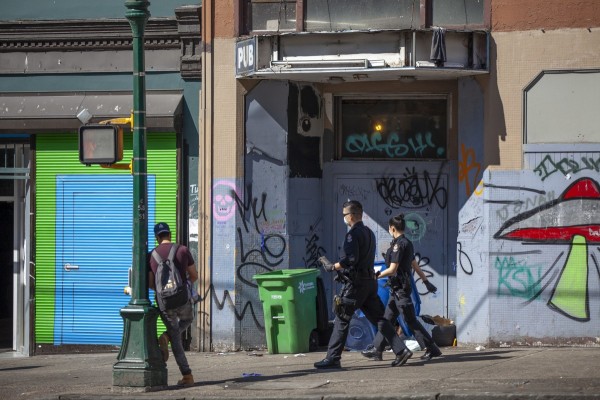Reform and transform: Police abolitionism and sloppy thinking
A response to James Wilt

RCMP officers assemble in Burnaby Mountain Park in response to a citizen’s protest rally against oil giant Kinder Morgan, Thursday, November 20, 2014. Photo by Mark Klotz/Flickr.
This article is a response to “Abolishing the police is the only reasonable response to Winnipeg Police killings” by James Wilt, published in Canadian Dimension on April 12, 2020.
I will start with a disclaimer: I am no expert on policing, criminal justice, the sociology of Winnipeg or police and community relations. I am a 70 year-old Marxist and democratic socialist, who has lived and worked in Toronto for the past 44 years, and have been organizing, doing education and writing for and about working class politics and public transit. A lifetime of conversations with working class people of all kinds of backgrounds (and points of view) tends to put an article such as this in perspective for me. I am also a long time reader, supporter and contributor to Canadian Dimension.
I was rather non-plussed when I first read this article on abolishing the police by James Wilt, the author of the recently published, fascinating, useful and incredibly well-researched book on public transit, Do Androids Dream of Electric Cars? Public Transit in the Age Google, Uber, and Elon Musk?
Having heard some of the younger activists with whom I work in the free transit movement muse about getting rid of the police force, I often found that most were not really serious about it as an immediate demand but were expressing their vision of how we might do things differently in an imagined future. There are other activists, many of whom are passionate defenders of the rights of the homeless, the poorest and those most targeted by the system and its repressive apparatus, who argue that police budgets need to be radically trimmed in order to pay for the kinds of social programs and services that could contribute to addressing some of the most glaring forms of inequality and injustice. Few of them seriously demand the complete elimination of policing, but some do.
I thought that perhaps Wilt had written a satirical piece, in the vein of the famous unsigned essay by Jonathan Swift in 1729, “A Modest Proposal”. It attacked the brutal treatment of Irish people by feigning an appeal to the Irish people to serve their babies up to English breakfast tables. But Wilt was dead serious, and I find this highly problematic.
In a nutshell, Wilt advances some passionate and trenchant criticisms of the often odious behaviours and practices of the Winnipeg Police Department and the criminal justice system. As well, he proposes a number of thoughtful alternative ways (most of them not all that original, but certainly relevant) to handle certain types of personal and social contradictions and disputes and to de-institutionalize some of the powers and autonomy exercised by the police. His discussion of alternatives to the existing criminal justice system is also interesting and positive.
Immediate abolition leaves oppressive structures and institutions untouched
But his basic argument—that the cumulative effects of social inequality, racism, colonialism, gender inequality make the Winnipeg Police Department (and possibly, the criminal justice system it is attached to) so hopelessly repressive and authoritarian, that they need to be abolished, rather than replaced, transformed or reformed—is simply wrong.
Wilt claims that certain forms of what are considered criminal activity, such as crimes against property, should not be considered crimes at all. Here he presents a view of the overall society as one that is not based on the norms and practices of bourgeois democracy, but a kind of semi-authoritarianism, which betrays a lack of understanding of the nature of bourgeois democracy and its contradictory reality. Police are simply seen as repressive agents of capital’s thirst for profit. The laws only ratify the power of the wealthy, and so on.
In reality, though, bourgeois democratic institutions are not simply a façade for a bloody and murderous dictatorship over the poor and colonized. Yes, there are instances of state acts of murder and even terrorism. The liberal democratic state and institutions facilitate private capital accumulation and are structured in ways which seek to repress, diffuse and co-opt alternative political and social movements, but these are mediated by the necessities of legitimating capitalism. The relative power, political ideology and organization of the working class and colonized Indigenous peoples also affect the character of liberal democracy (and in the subordinate strata, there are forms of class differences and other contradictions that also matter). We don’t live in a fascist dictatorship.
In calling for the abolition of policing, Wilt suggests that as long as the realities of current society (and its accompanying forms of oppression and social inequality) remain unchanged, we cannot have policing that resembles anything other than the murderous and horrifying entrenched practices he describes. One might ask, if policing cannot be reformed (given that it reflects these deeper social contradictions), how can we imagine that the basic social structures that underpin policing can ever be reformed? Is he saying that reforms do not matter and that short of an immediate social revolution, nothing can change?
Who is the working class and does it matter?
As in his book on transit, Wilt seems to define the working class in a narrow and rather truncated manner so as to include only those at the bottom of the job market, or left out of it, and only members of communities that live with other forms of structural oppression and discrimination. The larger working class, with its different strata—that need to be brought together on the basis of equality and common class interest—simply disappears in this picture of only the most oppressed and impoverished, versus everyone else. This perspective makes it impossible to conceive of building a common class consciousness and a political movement based on it. So, one might ask again, how can society’s current structures be changed?
How can a class society such as ours, wrought by contradictions, which often manifest themselves in the form of criminal activity, and in which working class and socialist political agency are virtually non-existent, manage without some kind of policing institution? Shouldn’t that institution be thoroughly transformed, by political struggle, into a more humane, limited and less autonomous one? How can this happen if it is simply abolished, or if criminal activity such as murder and theft, that often targets working class people (yes, working class people have personal property that can be stolen), is no longer illegal or goes unprosecuted?
It is one thing to envision what a future socialist and decolonized society might look like in 100 years and strive to move in that direction. But to talk as if the necessary political and social conditions of such a society exist at this moment is to fly in the face of reality. And, once again, it takes the struggle to transform or democratize these institutions off the agenda. Further, considering what it would take for a socialist government to challenge capital and bring in critical transformations of the state and the economy, policing would certainly have to change, but it would have to play a role in dealing with those who organize to oppose these changes.
Calling for the abolition of policing betrays a lack of familiarity with the lives and opinions of working class people and communities. Working class people of all strata have ambivalent experiences and opinions about policing and criminal justice. Many have had bad experiences with the clearly flawed nature of these institutions, but at the same time, look to them for protection from criminal activity and demand that they exercise their functions in a fair, just and non-discriminatory way. These institutions reflect the inequality, racism, gender oppression and colonialism that characterize many aspects of Canadian capitalist (a concept that is strangely absent from Wilt’s article) society. But working people want these institutions to operate differently, better, and in their interest.
There needs to be a struggle to change these institutions, as part of the larger struggle to democratize society and the state and challenge the power and domination of the capitalist class. But the way forward is not a utopian plea to eliminate them. Yes, they may require a more radical transformation (in Winnipeg and elsewhere a genuinely progressive government might disband the current police force and rebuild it differently or expunge its racist and colonialist core). Even the Globe and Mail published a recent editorial advocating the transformation and downsizing of Canada’s prison system.
Calling for the abolition of the police force sounds ridiculous to most people because it is. Radical sloganeering is no substitute for engaging with the complexities and requirements of serious left strategies for change.
Herman Rosenfeld is a Toronto-based socialist activist, educator, organizer and writer. He is a retired national staffperson with the Canadian Auto Workers (now Unifor), and worked in their Education Department.










